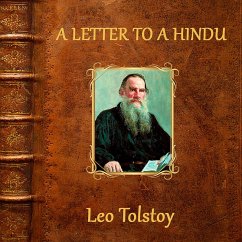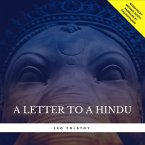"A Letter to a Hindu" (also known as "A Letter to a Hindoo") was a letter written by Leo Tolstoy to Tarak Nath Das on 14 December 1908. The letter was written in response to two letters sent by Das, seeking support from the Russian author and thinker for India's independence from colonial rule. In "A Letter to a Hindu", Tolstoy argued that only through the principle of love could the Indian people gain independence from colonial rule. Tolstoy saw the law of love espoused in all the world's religions, and he argued that the individual, nonviolent application of the law of love in the form of protests, strikes and other forms of peaceful resistance were the only alternative to violent revolution. These ideas ultimately proved to be successful in 1947 in the culmination of the Indian independence movement.
Dieser Download kann aus rechtlichen Gründen nur mit Rechnungsadresse in A, D ausgeliefert werden.








